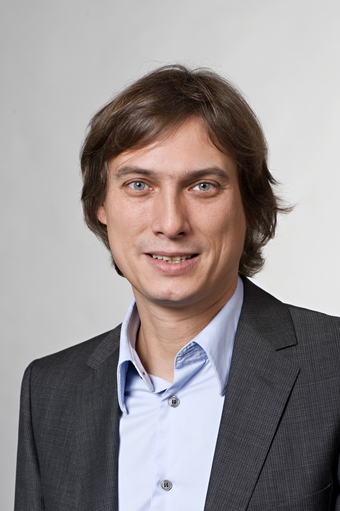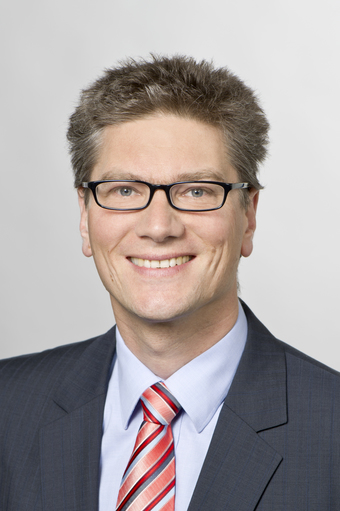Friedrich Simmel and Franz Pfeiffer receive ERC grants
EU is funding research at the physics department
2016-04-25 – News from the Physics Department

The ERC grants from the European Research Council are among the most distinguished research awards in Europe. They are presented in three categories: Starting Grants for promising young scientists, Consolidator Grants for young principal investigators who earned their doctorate seven to twelve years ago and Advanced Grants for excellent and established scientists who have demonstrated significant achievements within the last ten years. The funding associated with a grant can be as high as 3.5 million Euros.
Scientists of TUM received a total of nine ERC-Grants this year; two of them went to the Physik-Department. Prof. Friedrich Simmel and Prof. Franz Pfeiffer are the successful award winners for physics. A further prize went to the Deparment of Informatics, the others to the Department of Medicine.
Competition for the EU grants is very intense: This year about 2000 projects applied for Advanced Grants. However, only 277 grants were awarded for the whole EU and over all subject areas. The physics department has already been rather successful in previous rounds: Since 2008 it has earned 15 ERC grants.
Find out more about the researchers and their projects
Prof. Dr. Friedrich Simmel
Friedrich Simmel, faculty member of the Physics department, focuses on bionanotechnology and the physics of synthetic biological systems. His research emphasizes artificial molecular machines and structures consisting of biological molecules and the design of artificial biochemical control loops.
In the project funded by the ERC Advanced Grant Friedrich Simmel intends to find new ways to create intelligent, dynamic microstructures from polymer gels and nucleic acids. The cell-sized components are to have sensory and information processing capabilities and are to be able to generate various materials depending on their local chemical situations.
Another approach is the evolutionary development and optimization of RNA-based molecular switches and nanostructures. Methods derived from molecular evolutionary processes are to generate a large number of various components from which the most suitable components for a particular given task are artificially selected. The objective is a range of macroscopic materials using DNA-programmed intelligence to provide new properties for fields such as environmental sensing technologies and biocatalysis. These materials will also be able to autonomously perform innovative new functions as adaptive materials
Friedrich Simmel has held the chair of Bioelectronics since 2007. In 2013 he was inducted into acatech, the German Academy of Science and Engineering. The German Research Foundation named Prof. Simmel an Emmy Noether-Nachwuchsforscher (Young Researcher) in 2002.
- Further information:
- The thousand-droplets Experiment – 2014-02-24
- Nanotech structures mimic nature’s way of tunneling through cell walls – 2012-11-19
Prof. Dr. Franz Pfeiffer
Franz Pfeiffer, faculty member of the Physics department, has received an Advanced Grant for the further expansion of his activities in the area of biomedical X-ray physics.
Modern medicine would be inconceivable without X-ray images. But in the past imaging techniques utilized only the absorption of X-ray radiation. In the case of soft tissue, for example in the lungs, the contrast between healthy and unhealthy tissue is insufficient for early diagnostics. Diseased tissue is not visible to the physician in the X-ray image until serious damage has already occurred.
For many years now Franz Pfeiffer has been experimenting with monochromatic X-ray radiation which also makes it possible to generate phase contrast and dark field images in addition to absorption images. The project supported by the ERC focuses in particular on the dark field method. Based on images already created with live small animals, the method is to be further developed to the point that dark field computer tomography can also be introduced in clinical use. This method could mean substantial advances in particular in the diagnosis of COPD (chronic obstructive pulmonary disease), which afflicts many millions in Europe alone.
In 2009 Franz Pfeiffer was appointed to the Chair of Biomedical Physics In 2011 he was awarded the Gottfried Wilhelm Leibniz Prize of the German Research Foundation. And this wasn’t the first time the ERC has granted Franz Pfeiffer funding: He also received a Starting Grant in 2009.
- Further information:
- New X-ray method uses scattering to visualize nanostructures – 2015-11-19
- New state-of-the-art compact X-ray source – 2015-10-29
Further Information
Contact
- Prof. Dr. Friedrich C. Simmel
- Physik-Department / ZNNTechnische Universität MünchenAm Coulombwall 4a, 85748 Garching, GermanyTel.: +49 89 289 11612E-Mail: simmel@ph.tum.de
- Prof. Dr. Franz Pfeiffer
- Physik-Department / IMETUMTechnische Universität MünchenJames-Franck-Str. 1, 85748 GarchingTel.: +49 89 289-12551 (Büro)Tel.: +49 89 289-12552 (Sekretariat)E-Mail: franz.pfeiffer@tum.de

